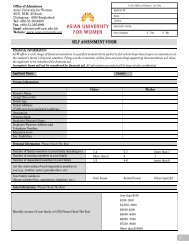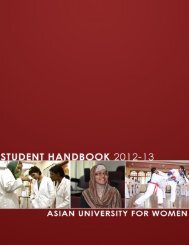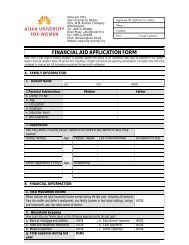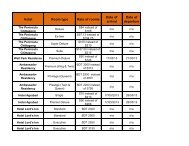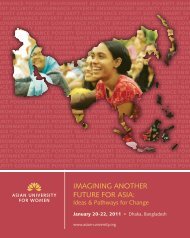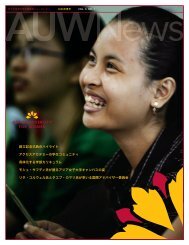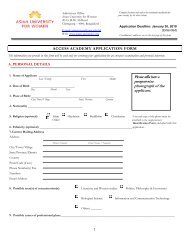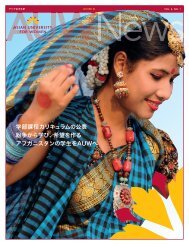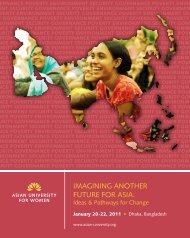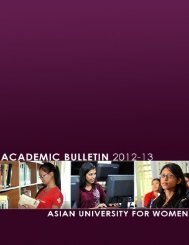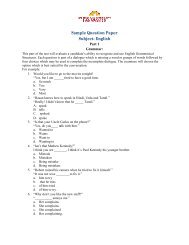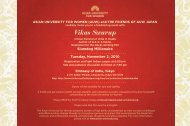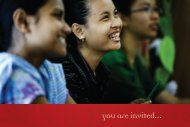Fall 2010 - Asian University for Women
Fall 2010 - Asian University for Women
Fall 2010 - Asian University for Women
You also want an ePaper? Increase the reach of your titles
YUMPU automatically turns print PDFs into web optimized ePapers that Google loves.
UNDERGRADUATE CURRICULUM 9<br />
New Directions in AUW’s Undergraduate Curriculum<br />
If the <strong>Asian</strong> <strong>University</strong> <strong>for</strong> <strong>Women</strong> is to demand critical thinking and excellence<br />
from its students, it must deliver the same to them in return.<br />
AUW’s undergraduate curriculum,<br />
revised under the leadership of<br />
Dr. Mary J. Sansalone, the<br />
recently appointed Provost and<br />
Chief Academic Officer, demonstrates both the<br />
<strong>University</strong>’s capacity <strong>for</strong> self-examination and its<br />
resolve in supplying students a first-rate education.<br />
As a young institution, AUW has avoided the<br />
pitfalls of complacency by approaching every<br />
new academic year with a renewed sense of rigor<br />
and zeal. The most recent changes in AUW’s<br />
undergraduate curriculum reaffirm the <strong>University</strong>’s<br />
dedication to progress as its academic programs<br />
and students evolve.<br />
AUW’s liberal arts program has numerous objectives.<br />
The <strong>University</strong> seeks to provide its students<br />
with a curriculum that is at once enduring and<br />
contemporary; that develops exceptional critical<br />
thinking, writing, and speaking skills; and that<br />
encourages tolerance and creative problem-solving<br />
in a world faced with complex problems <strong>for</strong><br />
which there are no simple solutions. AUW must<br />
offer its students a breadth of study in the core<br />
curriculum, depth in the individual majors, and<br />
preparation <strong>for</strong> graduate study. Most important,<br />
AUW’s academic program strives to instill an<br />
ethos of public service in its students, who will be<br />
trailblazers <strong>for</strong> a generation of confident and ethical<br />
leaders in Asia.<br />
To achieve these goals, AUW’s curriculum has<br />
been tailored to meet the needs of Asia while<br />
also drawing upon the best aspects of liberal arts<br />
programs at renowned universities in the West<br />
such as Ox<strong>for</strong>d, Harvard, the <strong>University</strong> of<br />
Chicago, Stan<strong>for</strong>d, Yale, and Cornell. In this way,<br />
AUW hopes to expose its students to established<br />
methods of teaching without ever compromising<br />
the fundamentally regional nature of the program.<br />
In the “Regional Challenges” courses, <strong>for</strong><br />
instance, students apply critical thinking skills to<br />
learn about the challenges facing Asia, including<br />
environmental and public health challenges,<br />
human rights, and education and literacy.<br />
“It was a wonderful intellectual endeavor to meld the best of Western<br />
educational traditions into a curriculum that speaks to Asia and its<br />
challenges and seeks to nurture leaders.”<br />
“It was a wonderful intellectual endeavor to meld<br />
the best of Western educational traditions into a<br />
curriculum that speaks to Asia and its challenges<br />
and seeks to nurture leaders. Our new core curriculum<br />
focuses on developing in each<br />
student a broad worldview, creativity of thought<br />
and vision, critical reasoning skills, ethical<br />
responsibility, and a vision of self that engenders<br />
the confidence to think boldly about the future,”<br />
Professor Sansalone says.<br />
In addition to the Regional Challenges courses,<br />
the core curriculum consists of four modes of<br />
thought: “Social Analysis,” “Ethical Reasoning,”<br />
“Literature, Civilization Studies, and the Arts,”<br />
and “Sciences and Mathematics.” The core curriculum<br />
is designed to introduce first-year<br />
<strong>University</strong> students to the important modes of<br />
thought and critical reasoning that will underpin<br />
their entire undergraduate experience at AUW. In<br />
the Social Analysis category, <strong>for</strong> example, students<br />
study the classic texts of social and<br />
political thought; explore themes of power, identity,<br />
and resistance; and examine philosophical,<br />
psychological, and scientific approaches to<br />
understanding how the brain<br />
works in a course called “The<br />
Mind.”<br />
All first-year undergraduate students<br />
must also take two writing<br />
and rhetoric intensive seminars,<br />
which are offered in all the academic<br />
disciplines. Each seminar<br />
will have no more than 20 students in the classroom<br />
and will explore topics such as “Banned<br />
Books: Writing about Incendiary Topics,”<br />
“Writing of the South <strong>Asian</strong> Diaspora,” “Human<br />
Rights,” and “<strong>Women</strong>’s Issues in a Transnational<br />
World.” Professor Sara Amin, now in her second<br />
year of teaching at AUW, comments: “I love that<br />
PROFESSOR SANSALONE



